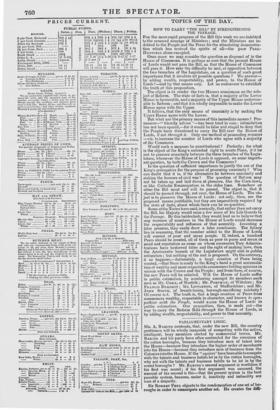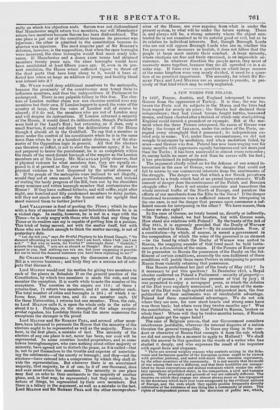PARLIAMENTARY LOGIC.
MR. A. BARING contends, that, under the new Bill, the country gentlemen will be wholly incapable of competing. with the active, intelligent, busy members elected by commercial towns. Mr. BARING and his party have often contended for the retention of the rotten boroughs, because they introduce men of talent into the House-because they introduce the higher order of merchants into the House-because they introduce men of business from the Colonies into the House. If the " squires" have been able to compete with the talents and business habits let in by the rotten boroughs, why not with the talents and business habits to be let in by the sound boroughs ? Mr. BARING'S second argument is worthless if his first was sound; if his first argument was unsound, the amount of his second is this-that the present system is the best possible system, because, under it, inactivity and imbecility are sure of a majority.
Sir ROBERT PEEL objects to the condemnation of one set of bo- roughs in order to emancipate another set. He creates the di& culty on which his objection rests. Sarum was not disfranchised that Manchester might return two members, nor will Manchester return two members because Sarum has been disfranchised. The one place is put out of the constitution because its presence was injurious ; the other is admitted to the constitution because its absence was injurious. The most singular part of Sir ROBERT'S delusion, however, is the supposition, that when the open boroughs were increased, the close boroughs would find more ready tole- rance. If Manchester and a dozen more towns had obtained members twenty years ago, the close boroughs would have been annihilated at least fifteen years ago. If, even in its pre- sent condition, the House retain sufficient vigour to throw off the dead parts that have long clung to it, would it have ef- fected less when so large an addition of young and healthy blood was infused into it ?
Mr. WYNN would deny additional members to the metropolis, because the proximity of the .constituency may tempt them to influence members, and thus the independence of Parliament be endangered. There is one palpable fallacy in this fear. The elec- tors of London neither claim nor can exercise control over any members but their own. If London happen to speak the voice of the country at large, then the voice of London will of course be obeyed ; if it do not, the members who are not of London may and will despise its instructions. If London returned a majority of the House, it would direct its deliberations, though Parliament were held at the Land's End ; but returning, as it does, only a small fraction, it could not direct the deliberations of the House though it should sit in the Guildhall. To say that a member is more under the control of his constituents when he is in the same town than when he is at a hundred miles distance, is of the cha- racter of the Opposition logic in general. All that the electors i can threaten or inflict, is not to elect the member again ; if he be not prepared to brave the punishment, he is as completely within the reach of the most distant borough of the empire as the London members are of the Livery. Mr. MACAULAY justly observes, that if physical violence be what members fear, they are equally ex- posed to it at present as they ever will be. The fear of future physical violence is best disproved by the actual absence of it. If the people of the metropolis were inclined to act illegally, would they not at once march down to Westminster, and instead of waiting the tardy progress of the Bill, turn out by the shoulders every nominee and rotten borough member that contaminates the House ? If they have suffered hitherto, and still suffer, night after night, one hundred and fifty condemned members to delay justice, will they not much more suffer the honest and the upright that must succeed them to further justice?
Lord VALLETORT is fond of quoting the Times ; which he does with a fury of manner that makes most beholders believe he is in a violent rage. In reality, however, he is not in a rage with the Times—he is only angry with those who think that any thing the Times or its readers can say is capable of putting him in a passion. This trick of being moved, not with the matter itself, but with those who are foolish enough to think the matter moving, is not of yesterday's date. " Let me tell you," says Sir Fretful Plagiary to his friend Dangle, " 'tis damned affronting in you to suppose that I am hurt, when I tell you I am not." " But why so warm, Sir Fretful ?" interrupts Sneer. " Gadslife," retorts the knight, " you are as absurd as Dangle ! How often must I repeat to you, that nothing can vex me, but your supposing it possible for me to mind the damned nonsense you have been repeating to me !"
Sir CHARLES WETHERELL says the discussion of the Reform Bill is a serious business ; and truly they are a serious set of sub- jects that discuss it.
Lord MILTON would rest his motion for giving two members to each of the places in Schedule D on the general practice of the Constitution, by which two members is made the rule, and one member the exception. It is worth while to note the number of the exceptions. The counties in the empire are 114 ; of these I returns four, 71 return two members, and 42 one member each. The total number of cities and boroughs is 264 ; of which 1 re- turns four, 198 return two, and 65 one member each. Of the three Universities, I returns but one member. Thus, the rule, as Lord MILTON calls it, is upon the whole only in the ratio of about 3 to 1. Perhaps, on the strength of the adage exceptio probat regulam, his Lordship thinks that the more numerous the exceptions the stronger is the proof.
Lord MILTON and Sir ROBERT PEEL, and several other mem- bers, have laboured to persuade the House that the minority of the electors ought to be represented as well as the majority. There is here, in the first place, a mistake of fact. The minority of the electors of any one place is not, never has been, nor ever will be represented. In some counties landed proprietors, and in some towns boroughmongers, who care nothing about either majority or minority, have agreed not to disturb the peace, as it is called—that is, not to put themselves to the trouble and expense of ascertain- ing the sentiments—of the county or borough ; and they—not the electors—have entered into a compromise by which they shall di- vide the representation. But wherever there is an ascertained majority, that majority, be it of one, be it of one thousand, does and ever must return the members. The minority in one place may find an echo to their sentiments in the majority of another place, and, in that way, be represented ; but they cannot, in the nature of things, be represented by their own members. But there is a fallacy in the argument, as well as a mistake in the fact. I.ord MILTON and Sir ROBERT PEEL and the other incornprehen- sives of the House, are ever arguing from what is under the present system, to what will be under the future system. There is, and always will be, a strong minority where the object con- tended for is not examined as to its natural good or evil, but as to its relation to individual interests. But, though Borough Lords who are out will oppose Borough Lords who are in, whether the Ins propose wise measures or foolish, it does not follow that the people at large must imitate their conduct. A large minority, where elections are free and freely exercised, is an impossible oc- currence. In whatever direction the people move, they must of necessity move together, because they are all operated on in a si- milar way. If there ever was a question on which large masses of the same kingdom were very nearly divided, it must be a ques- tion of no practical importance. The minority, for which Sir RO- BERT PEEL and Lord MILTON are so anxious to provide, is pre- cisely of that kind which may be safely neglected.



























 Previous page
Previous page